FolkWorld article by Christian Moll: Tilburg festival review No. 1
A great start of festival season 2001
2nd International Folk Festival Tilburg, the Netherlands
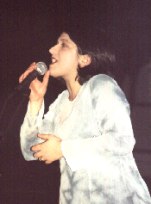 In the middle of the winter (end of january) a still quite new festival brings
sunshine into the cold and short days of continental Europe: In 2001 the second
edition of Tilburg International Folk Festival took place in Tilburg, a town
quite in the center of the Netherlands. It is not always easy to organise a
follow-up to an excellent first edition of a festival - the organizers of Tilburg
festival seemed to have no problems with this.
In the middle of the winter (end of january) a still quite new festival brings
sunshine into the cold and short days of continental Europe: In 2001 the second
edition of Tilburg International Folk Festival took place in Tilburg, a town
quite in the center of the Netherlands. It is not always easy to organise a
follow-up to an excellent first edition of a festival - the organizers of Tilburg
festival seemed to have no problems with this.
I attended only the three weekend days (friday till sunday), but the festival
was all in all five days long. The festival has a main instrument - the bagpipe
- which is featured in many of the participing bands; and a focus on one country
- this year it was Portugal - where there is a special evening concerts with
only band from this country, and some more along the whole festival.
Friday evening you could decide between two main concerts: the special concert
of the focal country Portugal, or a more local affair with brabantse music (Brabant
being the region around Tilburg). In this review you can read about the Portuguese
bands...
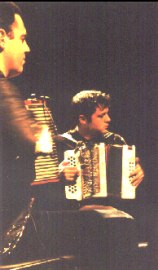 Four totally different bands from Portugal where invited for this memorable
evening. Frei Fado d'el Rei started the show off. This young band from Porto
is fronted by the fine female singer and percussionist Carla Lopez; the 'rest'
of the band consists of drums/percussion (Mário Costa), acoustic bass
(José Flávio Martins), synth (Quico), classical guitar (Ricardo
V. Costa) and guitar (Cristina Bacelar) - some of the musicians do also backing
vocals.
Four totally different bands from Portugal where invited for this memorable
evening. Frei Fado d'el Rei started the show off. This young band from Porto
is fronted by the fine female singer and percussionist Carla Lopez; the 'rest'
of the band consists of drums/percussion (Mário Costa), acoustic bass
(José Flávio Martins), synth (Quico), classical guitar (Ricardo
V. Costa) and guitar (Cristina Bacelar) - some of the musicians do also backing
vocals.
Frei Fado d'el Rei is a fresh sounding band combining different influences to
an interesting overall sound. The singing is sometimes melancholic, sometimes
also very lively. Besides an excellent string instrument section (with sometimes
a bit of flamenco flavour) they play some interesting percussion numbers. A
small point I dislike is that they do not have a 'real' melody instrument. They
play sometimes with the synth imitating e.g. the pipes - the sound of this is
good - but somehow for my eyes there is something missing...
A very promising band - hopefully they will be heard more often in this part
of Europe in future...
Second band on the big main stage where the Gaiteros de Lisboa (= bagpiper
from Lisbon). These guys - although naming themselves bagpipe player - play
actually just very few times the pipes. The joy of them is polyphonic music,
especially songs. Their appearance is special - they have many strange ideas
to make interesting sounds. Their stage show is fascinating, but their music
is in no way easy to listen to; it is a complex music and sound.
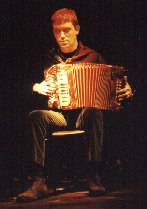 In the small hall followed my personal highlight of the night: Danças
Ocultas. When I first read the line up: Four man all playing only button accordions,
no singing, no percussion or other instruments - I thought this sounds strange,
and not too interesting...
In the small hall followed my personal highlight of the night: Danças
Ocultas. When I first read the line up: Four man all playing only button accordions,
no singing, no percussion or other instruments - I thought this sounds strange,
and not too interesting...
But as soon as I entered the room I was emediatly stuck by the music. Danças
Ocultas are very special - the interaction of these four accordionists is amazing.
Their music is as full of tension that you did not realise how the time goes
by. The music is excellently arranged and acts between very slow bits, where
only one accordion is playing - creating an atmosphere of very loud silence
- up to quite fast and very lively pieces. It is not easy to describe their
music - you simply have to see them live to get an idea of what they are doing
(or at least you should listen to their CD...).
Last but not least for the Portuguese evening was a big name of the Portuguese
music scene: Mísia. This diva is often called 'the new voice of fado'.
Mísia and her band created the typical atmosphere of 'saudade'.
It was a very special evening - and for me a great start of my first festival in 2001.
On saturday morning I was quite surprised while looking the first time of the day out of the window of my hotel room - everything was covered with snow... But nevertheless we used the time to do some sightseeing of the region - we decided to look at Tilburg town on sunday morning and went on saturday to the nice neighbouring town of Hertogenbosch...
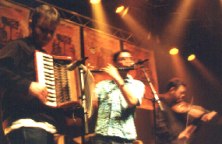 The evening concert was called 'Celtic Connections' and featured two of my favorite bands Danú from Ireland and Xosé Manuel Budiño from Galicia in Spain; additional there where Colin Offort from Australia (playing in the small hall, which I have missed somehow...) and the legend from Brittany Alan Stivell.
The evening concert was called 'Celtic Connections' and featured two of my favorite bands Danú from Ireland and Xosé Manuel Budiño from Galicia in Spain; additional there where Colin Offort from Australia (playing in the small hall, which I have missed somehow...) and the legend from Brittany Alan Stivell.
Kicking of the night where the young stars from Ireland Danú. FolkWorld has mentioned this very lively and fresh traditional Irish band for many times in the past - here now just few words: they where in good shape and played their heart out, well done lads!
I have never seen Alan Stivell, the legendary singer and harpist from Brittany
before, so I was very curious to see him with his - quite modern sounding -
band (guitar - Xavier Geronimi; bass - Mike Clinton; drums - Hubert Motteau).
He did a good show and he gave everything. You could see how he was working
with the audience, getting the crowd to singing his hymns. His music is deeply
rooted in the Breton traditions, the overall sound is a bit pathetic yet very
powerful. Many of his songs are earwigs staying in your head for days...
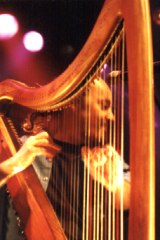 Last of the night was the young and succesful Galician bagpiper Xosé
Manuel Budiño. His second album was just released on Virgin records in
Spain. He and his band present the excellent compositions of Xosé. His
tunes are fresh but strongly connected to his own Galician traditions. His band
- Xosé on gaita Galego (the Galician bagpipe), uilleann pipes and low
whistle; Roberto Grandal on accordion; Guillermo Fernández (of Berrogüetto
fame) on guitar, Cesar Maráis on bass, Leando Detell on drums and finally
José Nine on sax - has a quite modern, fresh and a bit aggressive sound.
Xosé is working on all the arrangements - and it is working well.
Last of the night was the young and succesful Galician bagpiper Xosé
Manuel Budiño. His second album was just released on Virgin records in
Spain. He and his band present the excellent compositions of Xosé. His
tunes are fresh but strongly connected to his own Galician traditions. His band
- Xosé on gaita Galego (the Galician bagpipe), uilleann pipes and low
whistle; Roberto Grandal on accordion; Guillermo Fernández (of Berrogüetto
fame) on guitar, Cesar Maráis on bass, Leando Detell on drums and finally
José Nine on sax - has a quite modern, fresh and a bit aggressive sound.
Xosé is working on all the arrangements - and it is working well.
The Xosé Manuel Budiño band is a fitting final for an interceltic evening.
On sunday you get the most of music for your money - the concert starts early
afternoon and lasts untill about 11 pm - about nine hours, where you can can
listen to live music nearly without any break...
The sunday concert is called 'New Folk Adventures', it is focussed on fresh and young music of the different regions of Europe.
Kimmo Pohjonen - an absolute crazy accordionist from Finland - started off...
His show is absolutly stunning: imagine a big stage with just one person with
a big accordion on it - nothing else. Kimmo does with this accordion everything
- 'just' playing normally music, percussion, hiding behind it, fighting against
it, etc. He uses also very effectivly the sampling of different sounds - accordion,
several voice sounds and several percussive sounds. His show is really special
- if you ever get the chance to see him, see one of the strangest shows of European
folk music!
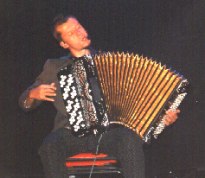 In the smaller hall a Dutch-Belgian group, with some of the finest musician
of the scene entered the stage. Cadans der Getouwen are presenting songs and
music of the spinners and weavers. Head behind this project is Guy Roelofs -
the bouzouki player of the band. Guy has gathered lots of material of this kind
from the 19th and early 20th century. Apart from gathering fine material he
has gathered a fine band to present this - among them are the Dutch singer Gerard
van Maasakkers, Anja van Reeth as female singer and Wouter Vandenabeele the
famous fiddler from Belgium (Ambrozijn, Olla Vogala, etc). It is nice to see
a group specialise in one aspect of the singing tradition of the region.
In the smaller hall a Dutch-Belgian group, with some of the finest musician
of the scene entered the stage. Cadans der Getouwen are presenting songs and
music of the spinners and weavers. Head behind this project is Guy Roelofs -
the bouzouki player of the band. Guy has gathered lots of material of this kind
from the 19th and early 20th century. Apart from gathering fine material he
has gathered a fine band to present this - among them are the Dutch singer Gerard
van Maasakkers, Anja van Reeth as female singer and Wouter Vandenabeele the
famous fiddler from Belgium (Ambrozijn, Olla Vogala, etc). It is nice to see
a group specialise in one aspect of the singing tradition of the region.
In the big hall next on were many musicians from Hungary: there where two companies
- the hurdy gurdy and the bagpipe orchestra - maybe about 40 musicians - very
traditonal music in costumes of the regions.
Troissoeur a young quartet from Belgium is a name to remember - especially
if you like unconventional very individual acoustic music. Troissoeur are four
lads - Edwin (fiddle and singing), Joris (double bass, singing) and Rein (accordion,
guitar and singing) all with second name Vanvinckenroye and finally Pieter Thys
on guitar, mandolin and percussion. They play very interesting music - highly
individual, but steeped in European and especially also flemish traditions.
Their talent to compose and arrange tunes is very high - another interesting
aspect is that they have developed their own language - flemish sung backwards!
This sound very unusual, interesting and individual, reminding me in their way
of singing a bit of singing from Finnish (I can not understand the Finish language...).
Watch out for Troissoeur they are worth it!
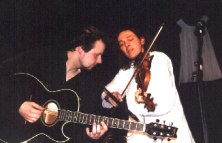 Afterwards another Flemish star presented his new project: Wouter Vandenabeele
(fiddler, arranger and composer; Ambrozijn, Olla Vogala, etc.). He has written,
gathered, arranged etc especially for this festival 'Het projet'. Excellent
music presented by some of the finest musicians of the scene - though for me
it was a bit too muched staged - especially after seeing Toissoeur...
Afterwards another Flemish star presented his new project: Wouter Vandenabeele
(fiddler, arranger and composer; Ambrozijn, Olla Vogala, etc.). He has written,
gathered, arranged etc especially for this festival 'Het projet'. Excellent
music presented by some of the finest musicians of the scene - though for me
it was a bit too muched staged - especially after seeing Toissoeur...
In the small hall an English trio could play two sets the sunday evening: (Chris)
Wood (Roger) Wilson and (Martin) Carthy. Three fine musicians showed their music
in a traditional way - without too much stage performance, they let alone the
music speak.
A totally different cup of tea where Companyia Elèctrica Dharma from Catalonia in Spain. Their show was very lively, their music very straight forward - they made the crowd dancing away...
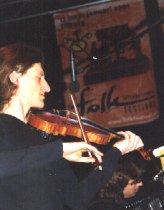 Their main instrument is the tenora, an old catalanic instrument reminding me
of a bigger version of the Breton bombarde. This instrument has a very loud,
intensive and breathtaking sound. Acompanied were the two tenora and one tible
players by a drummer/percussionist, an African percussionist, a pianist/keyboarder,
a trompet/accordion player, a bass guitarist and a sopran saxophonist, the latter
always running over the stage. This is real party music, it is good fun!
Their main instrument is the tenora, an old catalanic instrument reminding me
of a bigger version of the Breton bombarde. This instrument has a very loud,
intensive and breathtaking sound. Acompanied were the two tenora and one tible
players by a drummer/percussionist, an African percussionist, a pianist/keyboarder,
a trompet/accordion player, a bass guitarist and a sopran saxophonist, the latter
always running over the stage. This is real party music, it is good fun!
The end of the festival was marked by the famous Asturian (northern Spanish
region east of Galicia) gaitero José Ángel Hevia. His music has
found its way in several international pop charts - it is a very modern mix
with Asturian bagpipe traditions. His way of presenting the music is not always
too muched loved - especially the more traditional folk circles don't like it.
Hevia has invented an electric gaita (reminding me a bit of a hoover - the look
I mean!) - this one is very much liked especially by the young audience in his
home country. He is working a lot with show and modern music effects. One special
moment of his show is when the small Spanish pipe band with highland bagpipes
enter the stage...
Although the way back to Germany - with lots of snow and ice on the motorway
- was not to easy, I was very satisfied with this festival day, and also with
the whole weekend.
Well done, Tilburg festival organizers! Keep up the excellent work you are doing
and see you next year!
The featured country of 2002 is France - remember next january to start the
festival season of 2002 early, with the third edition of the excellent Tilburg
Folk Festival!
Further infos: Tilburg International Folk Festival homepage
There is another review of the Tilburg International Folk Festival in this issue: Review .
Photo Credit: All photos by The Mollis:
(1) Frei Fado d'el Rei, (2+3) Danças Ocultas, (4) Danú, (5) Alan Stivell, (6) Kimmo Pohjonen, (7) Toissoeur, (8) Wouter Vandenabeele
Back to the content of FolkWorld Articles, Live Reviews & Columns
To the content of FolkWorld online magazine Nr. 18
© The Mollis - Editors of FolkWorld; Published 4/2001
All material published in FolkWorld is © The Author via FolkWorld. Storage for private use is allowed and welcome. Reviews and extracts of up to 200 words may be freely quoted and reproduced, if source and author are acknowledged. For any other reproduction please ask the Editors for permission.
FolkWorld - Home of European Music

Layout & Idea of FolkWorld © The Mollis - Editors of FolkWorld
 In the middle of the winter (end of january) a still quite new festival brings
sunshine into the cold and short days of continental Europe: In 2001 the second
edition of Tilburg International Folk Festival took place in Tilburg, a town
quite in the center of the Netherlands. It is not always easy to organise a
follow-up to an excellent first edition of a festival - the organizers of Tilburg
festival seemed to have no problems with this.
In the middle of the winter (end of january) a still quite new festival brings
sunshine into the cold and short days of continental Europe: In 2001 the second
edition of Tilburg International Folk Festival took place in Tilburg, a town
quite in the center of the Netherlands. It is not always easy to organise a
follow-up to an excellent first edition of a festival - the organizers of Tilburg
festival seemed to have no problems with this.  Four totally different bands from Portugal where invited for this memorable
evening. Frei Fado d'el Rei started the show off. This young band from Porto
is fronted by the fine female singer and percussionist Carla Lopez; the 'rest'
of the band consists of drums/percussion (Mário Costa), acoustic bass
(José Flávio Martins), synth (Quico), classical guitar (Ricardo
V. Costa) and guitar (Cristina Bacelar) - some of the musicians do also backing
vocals.
Four totally different bands from Portugal where invited for this memorable
evening. Frei Fado d'el Rei started the show off. This young band from Porto
is fronted by the fine female singer and percussionist Carla Lopez; the 'rest'
of the band consists of drums/percussion (Mário Costa), acoustic bass
(José Flávio Martins), synth (Quico), classical guitar (Ricardo
V. Costa) and guitar (Cristina Bacelar) - some of the musicians do also backing
vocals. In the small hall followed my personal highlight of the night: Danças
Ocultas. When I first read the line up: Four man all playing only button accordions,
no singing, no percussion or other instruments - I thought this sounds strange,
and not too interesting...
In the small hall followed my personal highlight of the night: Danças
Ocultas. When I first read the line up: Four man all playing only button accordions,
no singing, no percussion or other instruments - I thought this sounds strange,
and not too interesting... The evening concert was called 'Celtic Connections' and featured two of my favorite bands Danú from Ireland and Xosé Manuel Budiño from Galicia in Spain; additional there where Colin Offort from Australia (playing in the small hall, which I have missed somehow...) and the legend from Brittany Alan Stivell.
The evening concert was called 'Celtic Connections' and featured two of my favorite bands Danú from Ireland and Xosé Manuel Budiño from Galicia in Spain; additional there where Colin Offort from Australia (playing in the small hall, which I have missed somehow...) and the legend from Brittany Alan Stivell. Last of the night was the young and succesful Galician bagpiper Xosé
Manuel Budiño. His second album was just released on Virgin records in
Spain. He and his band present the excellent compositions of Xosé. His
tunes are fresh but strongly connected to his own Galician traditions. His band
- Xosé on gaita Galego (the Galician bagpipe), uilleann pipes and low
whistle; Roberto Grandal on accordion; Guillermo Fernández (of Berrogüetto
fame) on guitar, Cesar Maráis on bass, Leando Detell on drums and finally
José Nine on sax - has a quite modern, fresh and a bit aggressive sound.
Xosé is working on all the arrangements - and it is working well.
Last of the night was the young and succesful Galician bagpiper Xosé
Manuel Budiño. His second album was just released on Virgin records in
Spain. He and his band present the excellent compositions of Xosé. His
tunes are fresh but strongly connected to his own Galician traditions. His band
- Xosé on gaita Galego (the Galician bagpipe), uilleann pipes and low
whistle; Roberto Grandal on accordion; Guillermo Fernández (of Berrogüetto
fame) on guitar, Cesar Maráis on bass, Leando Detell on drums and finally
José Nine on sax - has a quite modern, fresh and a bit aggressive sound.
Xosé is working on all the arrangements - and it is working well. In the smaller hall a Dutch-Belgian group, with some of the finest musician
of the scene entered the stage. Cadans der Getouwen are presenting songs and
music of the spinners and weavers. Head behind this project is Guy Roelofs -
the bouzouki player of the band. Guy has gathered lots of material of this kind
from the 19th and early 20th century. Apart from gathering fine material he
has gathered a fine band to present this - among them are the Dutch singer Gerard
van Maasakkers, Anja van Reeth as female singer and Wouter Vandenabeele the
famous fiddler from Belgium (Ambrozijn, Olla Vogala, etc). It is nice to see
a group specialise in one aspect of the singing tradition of the region.
In the smaller hall a Dutch-Belgian group, with some of the finest musician
of the scene entered the stage. Cadans der Getouwen are presenting songs and
music of the spinners and weavers. Head behind this project is Guy Roelofs -
the bouzouki player of the band. Guy has gathered lots of material of this kind
from the 19th and early 20th century. Apart from gathering fine material he
has gathered a fine band to present this - among them are the Dutch singer Gerard
van Maasakkers, Anja van Reeth as female singer and Wouter Vandenabeele the
famous fiddler from Belgium (Ambrozijn, Olla Vogala, etc). It is nice to see
a group specialise in one aspect of the singing tradition of the region. Afterwards another Flemish star presented his new project: Wouter Vandenabeele
(fiddler, arranger and composer; Ambrozijn, Olla Vogala, etc.). He has written,
gathered, arranged etc especially for this festival 'Het projet'. Excellent
music presented by some of the finest musicians of the scene - though for me
it was a bit too muched staged - especially after seeing Toissoeur...
Afterwards another Flemish star presented his new project: Wouter Vandenabeele
(fiddler, arranger and composer; Ambrozijn, Olla Vogala, etc.). He has written,
gathered, arranged etc especially for this festival 'Het projet'. Excellent
music presented by some of the finest musicians of the scene - though for me
it was a bit too muched staged - especially after seeing Toissoeur... Their main instrument is the tenora, an old catalanic instrument reminding me
of a bigger version of the Breton bombarde. This instrument has a very loud,
intensive and breathtaking sound. Acompanied were the two tenora and one tible
players by a drummer/percussionist, an African percussionist, a pianist/keyboarder,
a trompet/accordion player, a bass guitarist and a sopran saxophonist, the latter
always running over the stage. This is real party music, it is good fun!
Their main instrument is the tenora, an old catalanic instrument reminding me
of a bigger version of the Breton bombarde. This instrument has a very loud,
intensive and breathtaking sound. Acompanied were the two tenora and one tible
players by a drummer/percussionist, an African percussionist, a pianist/keyboarder,
a trompet/accordion player, a bass guitarist and a sopran saxophonist, the latter
always running over the stage. This is real party music, it is good fun!